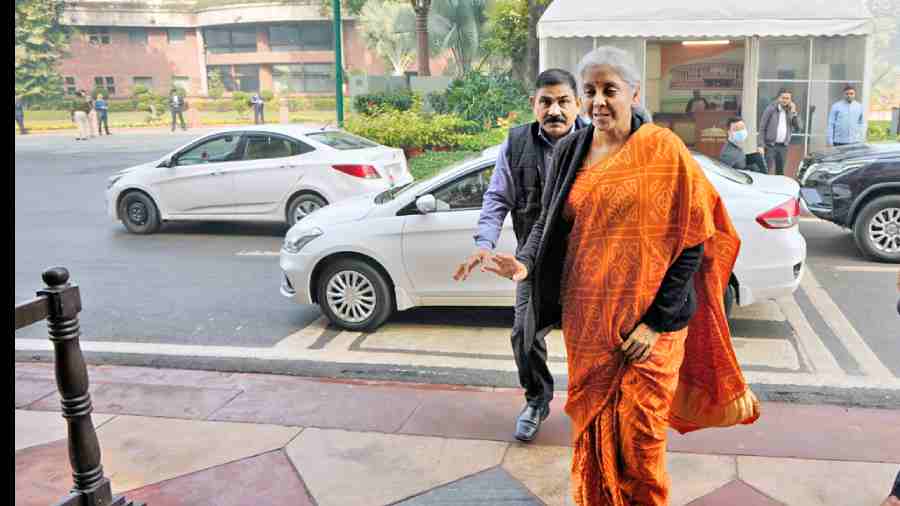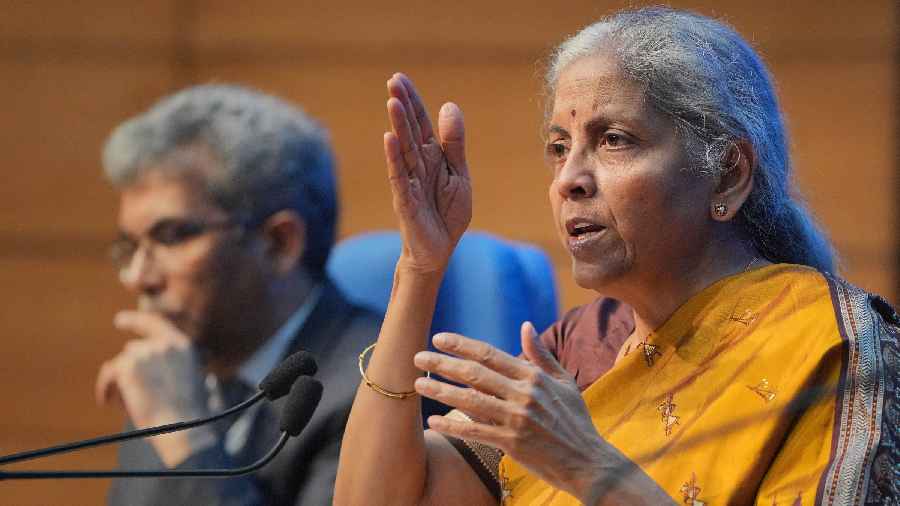The Opposition on Monday sought answers to fundamental questions on the economy that finance minister Nirmala Sitharaman has strenuously asserted is the fastest growing in the world.
Corporate tax, paid by business houses, contributes 8 percentage points less to the gross tax revenue now than it did in 2014 when the Narendra Modi government took over, Congress leader P. Chidambaram underlined in the Rajya Sabha.
The budget for this year reveals that gross tax revenue was Rs 27.57 lakh crore, of which corporate tax amounted to Rs 7.2 lakh crore or 26 per cent, he said. “In 2013-14, the gross tax revenue was Rs 11,55,838 crore, of which corporate tax was Rs 3,93,677 crore. As a proportion, corporate tax in the gross tax revenue was 34 per cent,” Chidambaram, finance minister in the UPA government, added.
“Who is contributing the other revenue? The rest is contributed by income-tax payers, middle class, upper middle class, other income-tax payers, excise duty payers, GST payers — which is you and I — customs duty, which is passed on to the common people, cesses, taxes on petrol and diesel, etc. That accounts today for 74 per cent!” The 8 percentage point bounty on corporate tax works out to Rs 2.5 lakh crore, Chidambaram said.
After conferring such a huge largesse, why was the finance minister having to go before the chambers of commerce and beseech the private sector to invest, he asked.
“If God is in His heaven, the BJP is in power and everything is hunky-dory, (and the) climate is extremely proficient for investment, why is the corporate sector not investing despite conferring a huge bonanza on them? That is my question,” Chidambaram said.
“Private investment is sluggish. They are, certainly, not summoning their animal spirits —I do not know why it is called animal spirits; these should be human spirits. But, somehow, we have got used to calling it animal spirits -- of investors. Whatever spirits, as long as it is not alcoholic spirits, why are they not summoning their spirits to invest?” he asked.
Chidambaram raised the question during the discussion on the Appropriation Bill, which sought authorisation from the Parliament to spend Rs 3.25 lakh crore on various programmes from the Consolidated Fund of India.
He said that consumption by the public was down. As a result, one-third of children were stunted and half of all women were anaemic.
According to the National Family Health Survey (2019-21), about 35 per cent of children under five years are stunted. The prevalence of anaemia among women in the reproductive age of 15 to 49 years in the country is 57 per cent.
Chidambaram said India’s trade deficit with other countries was increasing. The trade deficit with China alone was $73 billion (Rs 6 lakh crore) in 2021-22, he said.
The former finance minister had a fundamental question. When the budget for 2022- 23 was presented in February, the government had estimated growth in the nominal gross domestic product (GDP) at 11.1 per cent over last year’s figures.
Nominal GDP is calculated at current prices and therefore includes the effects of inflation. The budget has estimated the nominal GDP in 2022-23 at Rs 258 lakh crore.
“How does this 11.1 per cent break up? What is the inflation and what is the real growth?” Chidambaram asked. He said he had raised the same question nine months ago when the budget was presented and received no response. “I sincerely hope I will get an answer.”
Chidambaram went into an elaborate analysis of the Rs 3.25 lakh crore extra spending that the government was now seeking parliamentary approval for. Any drawal from the Consolidated Fund of India has to be submitted to both Houses for a vote.
He said the spending raised three scenarios. One, the government had already collected money in excess of the budgeted revenue receipts. Two, it didn’t have the money and intended to borrow it. “There is a third way — a little more technical,” the former finance minister said. This is based on the assumption that the nominal GDP this year is going to be a lot higher than the Rs 258 lakh crore estimate that underpins the budget for this year.
If the nominal growth is more than 11.1 per cent, the GDP will be more than Rs 258 lakh crore — the denominator will rise — therefore, you can borrow and spend another Rs 3,25,756 crore without breaching the fiscal deficit of 6.4 per cent,” he said.
“I want a specific answer. Is it ‘A’ or ‘B’ or ‘C’? And, I am willing to be corrected: ‘None of the above.’ I am willing to accept even an answer of ‘None of the above’.”
Finally, Chidambaram asked a loaded question: Would the Modi government be able to double the GDP by the time it demits office in 2024?
“In 1990-91, the GDP at constant prices was about Rs 25 lakh crore. And, after that, liberalisation started. In 12 years, this GDP doubled to Rs 50 lakh crore. In the next 10 years, it doubled again to Rs 98-99 lakh crore. So, the first time, the GDP took 12-13 years to double; second time, it took 10 years to double. Technically, therefore, one would expect, and this is a fair expectation,(that) a government which has been in power for nearly nine years should double the GDP in 10 years,” he said.
“The sum of Rs 100 lakh crore in 2013-14 should become Rs 200 lakh crore in 2023-24,when this government completes 10 years of governance. Will it be able to double to Rs200 lakh crore? I know the answer for myself. But I want the honourable finance minister and the government to answer that for the benefit of the honourable members. Will you be able to double the GDP, which you inherited, by the time you demit office in 10 years?” he asked.
The House was adjourned for 15 minutes because of the absence of finance minister Nirmala Sitharaman, who was supposed to move the Appropriation Bill in the Rajya Sabha at 2pm. Deputy Chair Harivansh called her name but she was not present. Sitharaman arrived just after2.15pm.
Ministers and members who are supposed to move amotion or speak are usually expected to be present in advance.
A Congress member said the minister’s absence reflected a disregard for House rules and procedures.
Other Opposition leaders, including Derek O’ Brien of Trinamul Congress, Kanimozhi of the DMK and Raghav Chadha of the Aam Aadmi Party sought answers from the government on unemployment, the rising prices of essential commodities and the poor funds flow to the states.












